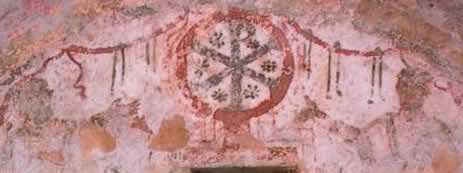Thursday
10.00: Baán István: Megnyitó
I. session; Chair: BAÁN ISTVÁN
10.30: Boudewijn Dehandschutter (Leuveni Katolikus Egyetem)
The Valentinian view on Creation according to the Adamantius
10:50: discussion
11.00: Perendy László (PPKE)
A teremtés teológusa. Antiokhiai Theophilosz Isten kezeművéről
11.20: discussion
11.30: coffee break
12.00: Adamik Tamás (ELTE)
Teremtés az Apophaszisz megalé szerint (Hippol. Refut.
6,9-16)
12.20: discussion
12.30: Ötvös Csaba (ELTE)
Teremtő tudatlanság? Démiurgosz-interpretációk a gnósztikus
kódexekben
12.50: discussion
13.00: Lunch
II. session; Chair: ADAMIK TAMÁS
15.30: Geréby György (ELTE)
A "semmiből teremtés" kialakulása
15.50: discussion
16.00: Peres Imre (Komáromi Selye János Egyetem)
A legkorábbi görög nyelvű ókeresztyén epitáfiumok
16.20: discussion
16.30: Sándor Balázs
Testté dermedt lelkek. Órigenész teremtés-teológiája a Gen 1-2
értelmezésében
16.50: discussion
17.00: coffee break
17.20: Somos Róbert (PTE)
Az isteni erő Órigenész megváltáselméletében
17.40: discussion
17.50: Kendeffy Gábor (KRE)
A Teremtő és képmása a Pszeudo-Klementinumokban
18.10: discussion
19.00: Dinner
Friday
III. session; Chair: PERENDY LÁSZLÓ
10.00: Tóth Judit (DE)
Hol van a Paradicsom? Az Édenkert "lokalizálása" a bűnbeesés előtt és
után Nüsszai Szent Gergely exegézisében
10.20: discussion
10.30: Kránitz Mihály (PPKE):
A teremtés értelmezése a szíriai atyáknál
10.50: discussion
11.00: Fehér Bence (KRE)
A teremtés Pannoniából nézve. Szövegkritikai problémák Victorinus
De fabrica mundijában
11.20: discussion
11.30: coffee break
12.00: Kiss Sebestyén (DE)
A teremtő Isten és az ember viszonya Arnobiusnál
12.20: discussion
12.30: Heidl György (PTE)
Természetfilozófia és teremtés (Szent Ambrus és Szent Ágoston)
12.50: discussion
13.00: Lunch
15.30-17.00: A MAGYAR PATRISZTIKAI TÁRSASÁG közgyűlése
17.00: Múzeumlátogatás: A térkép — a történelem szemüvege, Kecskemét,
Református Ókollégium
19.00: Dinner, with table music
Saturday
IV. session; Chair: SOMOS RÓBERT
10.00: Frenyó Zoltán
Szent Ágoston időfelfogása és a fizika időfogalmai
10.20: discussion
10.30: Nótári Tamás (KRE)
Az univerzum képe Aethicus Ister Cosmographiájában
10.50: discussion
11.00: coffee break
11.30: Németh Csaba (CEU)
Az Areopagita, a latin mystica theologia és Thomas Gallus
11.50: discussion
12.00: Zsigmond Benedek
A Teremtő tisztelete az örmény liturgiában
12.20: discussion
12.30. Nagy Levente (Kulturális Örökségvédelmi Hivatal)
Emberáldozat, jóslás, mágia, szellemidézés a Mithras-misztériumokban?
Vulgáris vádak, vagy a teremtő Mithras és a beavatott teremtmények
közötti kommunikáció eszközei?
13.00: Lunch
V. session; Chair: PERES IMRE
15.30: Dózsa László Attila:
"A mindenség modellje, áll a templom"
15.50: discussion
16.00: Bugár István
A természet szent könyve
16.20: discussion
16.30: Baán István
A phüszisz fogalma a VI. századi vitákban
16.50: discussion
17.00: Pesthy Monika (AVKF)
Az angyalok teremtése Pszeudo-Epiphaniosz Hexaémeronjában
17.20: discussion
17.40: Closing address: Baán István, President, Czeglédi Zsolt prior
19.00: Dinner

